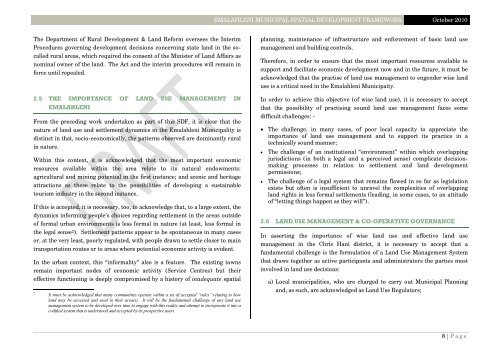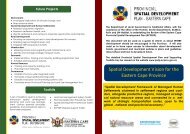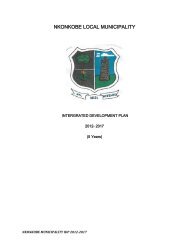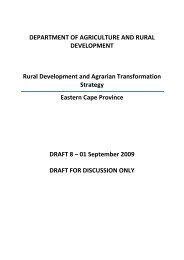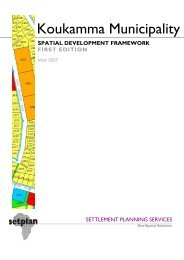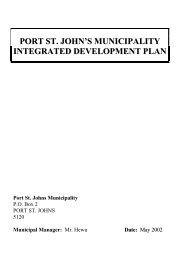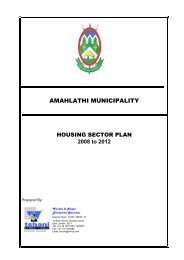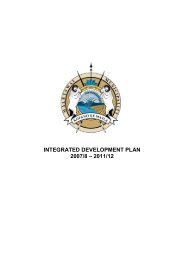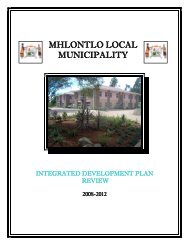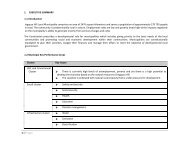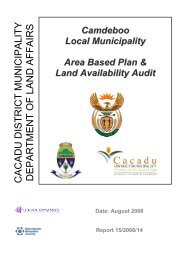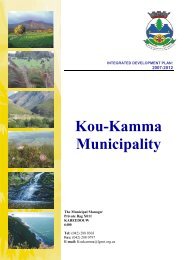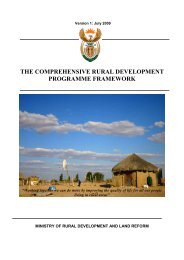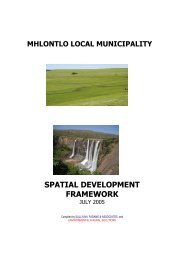Emalahleni Rural SDF_Phase 4.pdf - Provincial Spatial ...
Emalahleni Rural SDF_Phase 4.pdf - Provincial Spatial ...
Emalahleni Rural SDF_Phase 4.pdf - Provincial Spatial ...
You also want an ePaper? Increase the reach of your titles
YUMPU automatically turns print PDFs into web optimized ePapers that Google loves.
EMALAHLENI MUNICIPAL SPATIAL DEVELOPMENT FRAMEWORK October 2010The Department of <strong>Rural</strong> Development & Land Reform oversees the InterimProcedures governing development decisions concerning state land in the socalledrural areas, which required the consent of the Minister of Land Affairs asnominal owner of the land. The Act and the interim procedures will remain inforce until repealed.2.5 THE IMPORTANCE OF LAND USE MANAGEMENT INEMALAHLENIFrom the preceding work undertaken as part of this <strong>SDF</strong>, it is clear that thenature of land use and settlement dynamics in the <strong>Emalahleni</strong> Municipality isdistinct in that, socio-economically, the patterns observed are dominantly ruralin nature.Within this context, it is acknowledged that the most important economicresources available within the area relate to its natural endowments:agricultural and mining potential in the first instance; and scenic and heritageattractions as these relate to the possibilities of developing a sustainabletourism industry in the second instance.If this is accepted, it is necessary, too, to acknowledge that, to a large extent, thedynamics informing people’s choices regarding settlement in the areas outsideof formal urban environments is less formal in nature (at least, less formal inthe legal sense 2 ). Settlement patterns appear to be spontaneous in many casesor, at the very least, poorly regulated, with people drawn to settle closer to maintransportation routes or to areas where potential economic activity is evident.In the urban context, this “informality” also is a feature. The existing townsremain important nodes of economic activity (Service Centres) but theireffective functioning is deeply compromised by a history of inadequate spatial2It must be acknowledged that many communities operate within a set of accepted “rules” relating to howland may be accessed and used in their area(s). It will be the fundamental challenge of any land usemanagement system to be developed over time to engage with this reality and attempt to incorporate it into acodified system that is understood and accepted by its prospective users.planning, maintenance of infrastructure and enforcement of basic land usemanagement and building controls.Therefore, in order to ensure that the most important resources available tosupport and facilitate economic development now and in the future, it must beacknowledged that the practise of land use management to engender wise landuse is a critical need in the <strong>Emalahleni</strong> Municipaity.In order to achieve this objective (of wise land use), it is necessary to acceptthat the possibility of practising sound land use management faces somedifficult challenges: -• The challenge, in many cases, of poor local capacity to appreciate theimportance of land use management and to support its practice in atechnically sound manner;• The challenge of an institutional “environment” within which overlappingjurisdictions (in both a legal and a perceived sense) complicate decisionmakingprocesses in relation to settlement and land developmentpermissions;• The challenge of a legal system that remains flawed in so far as legislationexists but often is insufficient to unravel the complexities of overlappingland rights in less formal settlements (leading, in some cases, to an attitudeof “letting things happen as they will”).2.6 LAND USE MANAGEMENT & CO-OPERATIVE GOVERNANCEIn asserting the importance of wise land use and effective land usemanagement in the Chris Hani district, it is necessary to accept that afundamental challenge is the formulation of a Land Use Management Systemthat draws together as active participants and administrators the parties mostinvolved in land use decisions:a) Local municipalities, who are charged to carry out Municipal Planningand, as such, are acknowledged as Land Use Regulators;8 | Page


